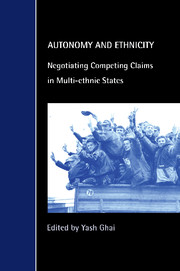Book contents
- Frontmatter
- Contents
- Acknowledgements
- List of Contributors
- 1 Ethnicity and Autonomy: A Framework for Analysis
- Part I Operating Autonomies
- Part II Failed Autonomies
- Part III Seeking Autonomies
- 8 Ethnicity and the New Constitutional Orders of Ethiopia and Eritrea
- 9 The Politics of Federalism and Diversity in Sri Lanka
- 10 Cyprus: From Corporate Autonomy to the Search for Territorial Federalism
- 11 Bougainville and the Dialectics of Ethnicity, Autonomy and Separation
- 12 The Implications of Federalism for Indigenous Australians
- List of Cases
- List of Legislation
- Index
10 - Cyprus: From Corporate Autonomy to the Search for Territorial Federalism
Published online by Cambridge University Press: 06 July 2010
- Frontmatter
- Contents
- Acknowledgements
- List of Contributors
- 1 Ethnicity and Autonomy: A Framework for Analysis
- Part I Operating Autonomies
- Part II Failed Autonomies
- Part III Seeking Autonomies
- 8 Ethnicity and the New Constitutional Orders of Ethiopia and Eritrea
- 9 The Politics of Federalism and Diversity in Sri Lanka
- 10 Cyprus: From Corporate Autonomy to the Search for Territorial Federalism
- 11 Bougainville and the Dialectics of Ethnicity, Autonomy and Separation
- 12 The Implications of Federalism for Indigenous Australians
- List of Cases
- List of Legislation
- Index
Summary
THE RELEVANCE OF CYPRUS
For a comparative study of autonomy and ethnicity, Cyprus provides an interesting example of two distinct ways to manage ethnic tensions. First, the 1960 constitution which was handed to Cyprus on the occasion of her independence from Great Britain was an unusual experiment in consociational democracy. Under these arrangements the two ethnic communities, the Greek and Turkish Cypriots, who were interspersed throughout the island, were granted corporate autonomy in the form of an elaborate set of group rights which were enshrined in the constitution itself. I will examine this experiment in light of what we know about the conditions under which this form of government is likely to succeed. I will conclude that consociationalism, as proposed in the constitution, could not have been expected to succeed in Cyprus, not because the constitution was too rigid as the Greek Cypriots tend to claim, and not because the Greek Cypriots were unwilling to compromise as the Turkish Cypriots are inclined to argue, but rather because of the very structure of Cypriot society. Consociationalism is most likely to succeed in a society with three or more segments and where no single segment is dominant. However, Cyprus was (and is) comprised of two highly segmented elements which are demographically and economically unequal.
Second, after 1974 when an Athens-sponsored coup d'état toppled President Makarios to force ‘Enosis’ (unification of Cyprus with Greece) and Turkey intervened militarily, bringing about the partition of the island, it became possible to contemplate a different form of government, namely a territorially based federation, as the Greeks and Turks were now physically separated through an exchange of population.
- Type
- Chapter
- Information
- Autonomy and EthnicityNegotiating Competing Claims in Multi-Ethnic States, pp. 219 - 241Publisher: Cambridge University PressPrint publication year: 2000
- 2
- Cited by

